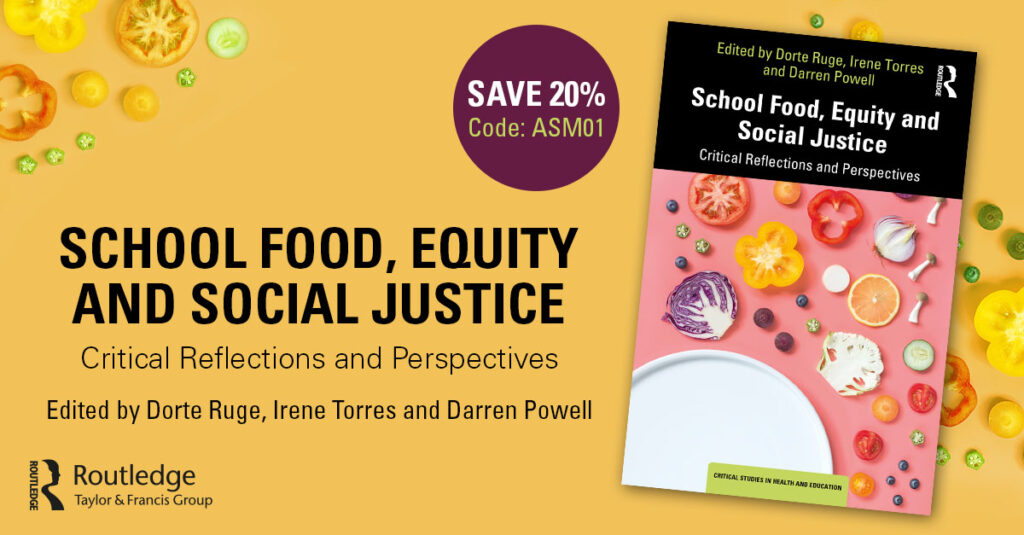Time: 13:00 - 14:00
Venue: Zoom meeting
This webinar will present the new book, School Food, Equity and Social Justice, with a focus on a chapter about the National School Nutrition Programme in South Africa that feeds over 9 million scholars every school day.

The Department of Anthropology, Archaeology and Development Studies at the University of Pretoria, FSNet-Africa, and the DSI-NRF Centre of Excellence in Food Security, invite you to a #FoodTalks seminar on a new book, School Food, Equity and Social Justice.
School feeding programmes make a key contribution to food security in many countries. In addition, as large purchasers of food, school food programmes can contribute to the development of the agricultural sector.
This webinar will present the new book, School Food, Equity and Social Justice, with a focus on a chapter about the National School Nutrition Programme (NSNP) in South Africa that feeds over 9 million scholars every school day. An overview of the book will be presented by one of the editors, Dorte Ruge. Then the co-authors of the South African chapter will share details of their findings on the NSNP.
Date: Wednesday, 16 March 2022
Time: 13:00 – 14:00
Register: Click here
Speakers

Dorte Ruge is an associate professor and lecturer at the Department of School and Social Sciences, UCL University College, Denmark. She works to integrate health promotion, education and sustainable development in school foodscapes. Her research focuses on school food systems in Denmark and internationally. She is currently the manager of Project LEARNFOOD, supported by Nordplus Horisontal, that aims to map and analyse Scandinavian school foodscapes.

Nokuthula Vilakazi is a University of Pretoria researcher with interests in sustainable and culturally acceptable, affordable and nutritious diets for food and nutrition security. Nokuthula holds a PhD and master’s degree in nutrition from the University of Pretoria. She has published in peer-reviewed journals and contributed to policy documents. She is an active science communicator on issues related to food.

Thabang N. Msimango is a PhD candidate who recently completed her MSc Biotechnology (cum laude) at the University of Pretoria. Her research project investigated the microbiological safety of fresh produce grown and supplied for school feeding programmes. She has presented her work at, among other events, the International Association for Food Protection in the USA and the 2nd International Food Safety and Security Conference.

Marc Wegerif is a senior lecturer in Development Studies at the University of Pretoria. His research focuses on food systems, agrarian transformation and land rights. He has over 30 years of development sector work experience from project level to national and international policy and advocacy. His doctorate was obtained with the Rural Sociology Group at Wageningen University.
Moderator

Obakeng Sepeng is a school teacher who sees the school food programme in action daily. He is also a University of Pretoria Development Studies master’s student. His research project is looking at food insecurity and responses to it among university students.
#FoodTalks Food talks to us at many levels, touching on important aspects of our lives and society. These dialogues are a space to talk about the current food system and how we can move to a socially and ecologically regenerative, just and nourishing food system in Africa.
Upcoming Events
Our GOALS
We recognise that producers, processors, distributors and consumers are incorporated into the food system under varying terms and returns. We also recognise the economic, social, human and environmental health impacts associated with food security. Therefore our goal is to conduct research, build capacity and disseminate findings that will promote a sustainable food system in South Africa.
Our MISSION
Our research is concerned with the scale, nature, causes and consequences of food insecurity in South Africa and elsewhere on the African continent. Thus our mission is to investigate products, technologies, processes and policies that can reduce food insecurity and mitigate its negative outcomes. We seek to make a difference to food security by linking innovative science with critical enquiry.



